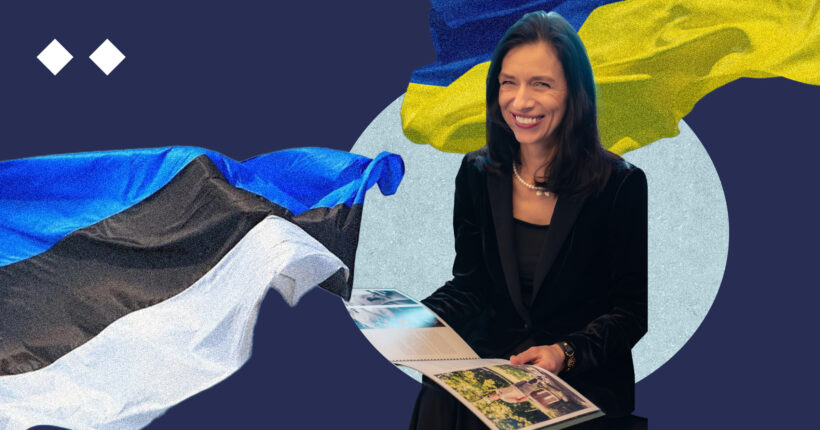
At the beginning of the meeting, we presented the ambassador with a special gift — an album, which is the special project of the BGV Charity Fund, Rubryka, and the Estonian government. The album features stories of Ukrainian soldiers who got prosthetics in Estonia. Thanks to this project, in 2023, 12 Ukrainian service members have already received modern bionic prostheses.
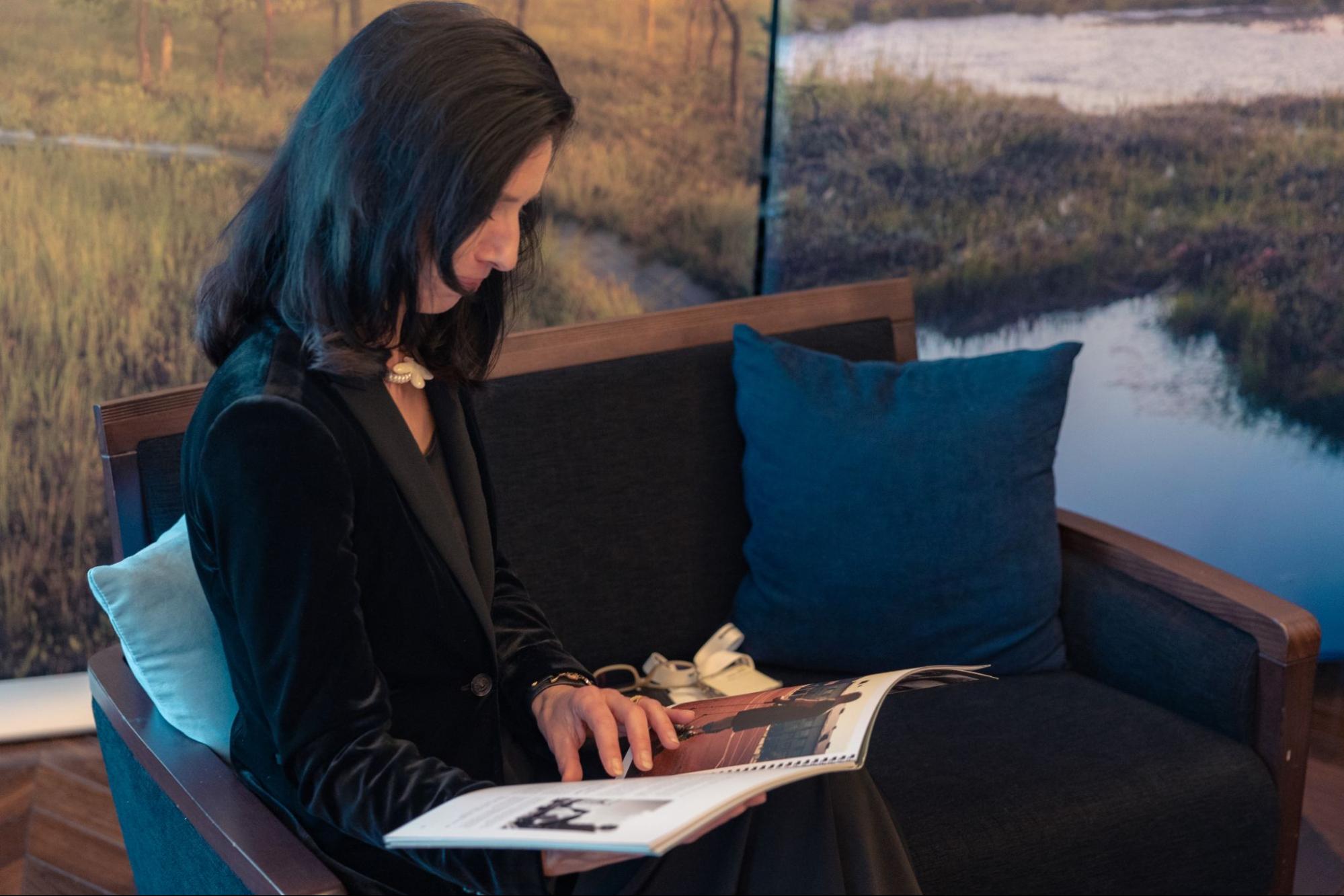
Cooperation between Estonia and Ukraine in the medical field began in 2014. After Russia's full-scale invasion, the government of Estonia started a large-scale program to treat the Ukrainian military and civilians. Estonians wanted to deepen the interaction as much as possible. Moreover, if certain countries are ready to help only wounded civilians, then Estonians, on the contrary, try their best to help those who protect Ukraine from Russian occupying forces. The BGV charity fund became the operational link of the program to send Ukrainians for rehabilitation abroad.
— Are there any similar projects in the works? Will the project continue?
— I visited one of the Kyiv hospitals, which had a rehabilitation center on two floors. We met with the soldiers who have come from the front and who are receiving rehabilitation there, and it was difficult. Nevertheless, I was very impressed by the mindset and even positive attitude of the soldiers, their resilience, and strength. Many of them had lost legs or even hands, but they were still ready to return to the front. It's really impressive what your men and women are doing at the front and, actually, what all the Ukrainians are doing. All the organizations, NGOs, and journalists — I really appreciate all your hard work.
Ambassador Kolk has been in Ukraine for three months already. Before that, she was posted as the Estonian ambassador to Turkey, Iran, and Azerbaijan. According to Kolk, Estonian diplomats' goals are to be very active in the country where they are living and working. In Ukraine, in particular, she aims to raise awareness that Estonia is here for Ukrainians and will do its best to show that Ukraine is not alone in this fight against Russia.
On Ukraine's recovery
"When Ukraine says they need help, we see what we can do"
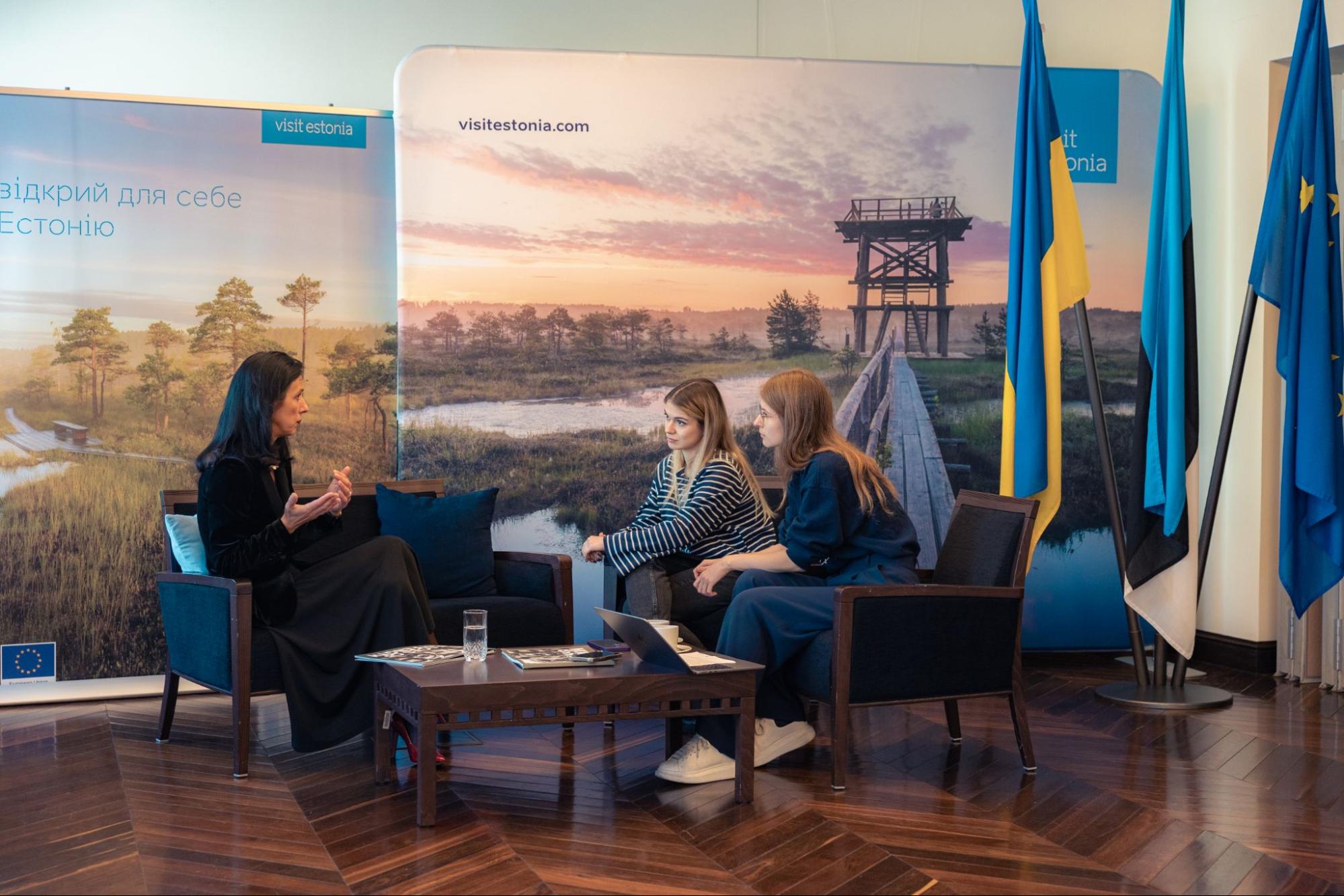
— Estonia has been at the forefront of Ukraine's rebuilding. In particular, it was the first country that implemented one of the points of Zelensky's formula and has taken up the responsibility for the restoration of one region/city. Estonia is helping to rebuild the Zhytomyr region, and just recently, the bridge in the city of Malyn has been restored, and a modular kindergarten in Ovruch was built with the money of the Estonian government. Can you let us in on any further projects in this area?
— I would like to speak in general about the help of the Estonians, the Estonian government, and Estonians' attitude towards Ukraine first. We all come from the same past, basically, as we all have witnessed the occupation of the Soviet Union. We both have this neighbor [Russia — ed.], and we know what this neighbor can be capable of.
Estonia has actually supported Ukraine for many years, since 1991. We are strong supporters of Ukraine's aspirations to become a member of the European Union, and we are also supporters of NATO enlargement, especially after the 2014 events — Russia's occupation of Crimea and the war in the Luhansk and Donetsk regions. Then Estonia was among the first ones, of course, together with other Baltic states, to raise awareness about this awful occupation and this very brutal breach of international law. I was dealing with Ukrainian issues at that time in Estonia's Ministry of Foreign Affairs, serving as the vice minister for legal consular affairs.
Estonians have long been asking themselves the question of what else can we do. What sanctions can we implement for the Russian Federation in the European Union? What can we do in other organizations? I can confirm that since then, all Estonian diplomats had their talking points. We have tried to support Ukraine for many years, so when this real, actual, brutal attack started in February 2022, we didn't change our attitude or priorities, and we just continued everything we had done so far. We just intensified all this. Estonia was among the first ones to give weapons and ammunition to Ukraine at the beginning of the war. Basically, we gave everything we had in our stocks.
The military aid that Estonia has provided to Ukraine is over €400 million, which is more than a third of the Baltic country's annual defense budget. On a per capita basis, Estonia's defense assistance is one of the largest in the world.
We are a small country of 1.3 million people, but the size doesn't matter here — the actions matter. So we wanted to be pioneers to show to the other countries, to the world that, if we can do it, you all can do it. As a small country, we have some budgetary implications. There are so many fields that we are discussing and trying to help in — if we cannot give weapons in huge amounts because we simply don't have them, we are trying to find other ways to be of help. We were also among the first countries who decided that we had to start to rebuild Ukraine now and not wait until the end of the war, until Ukraine's victory.
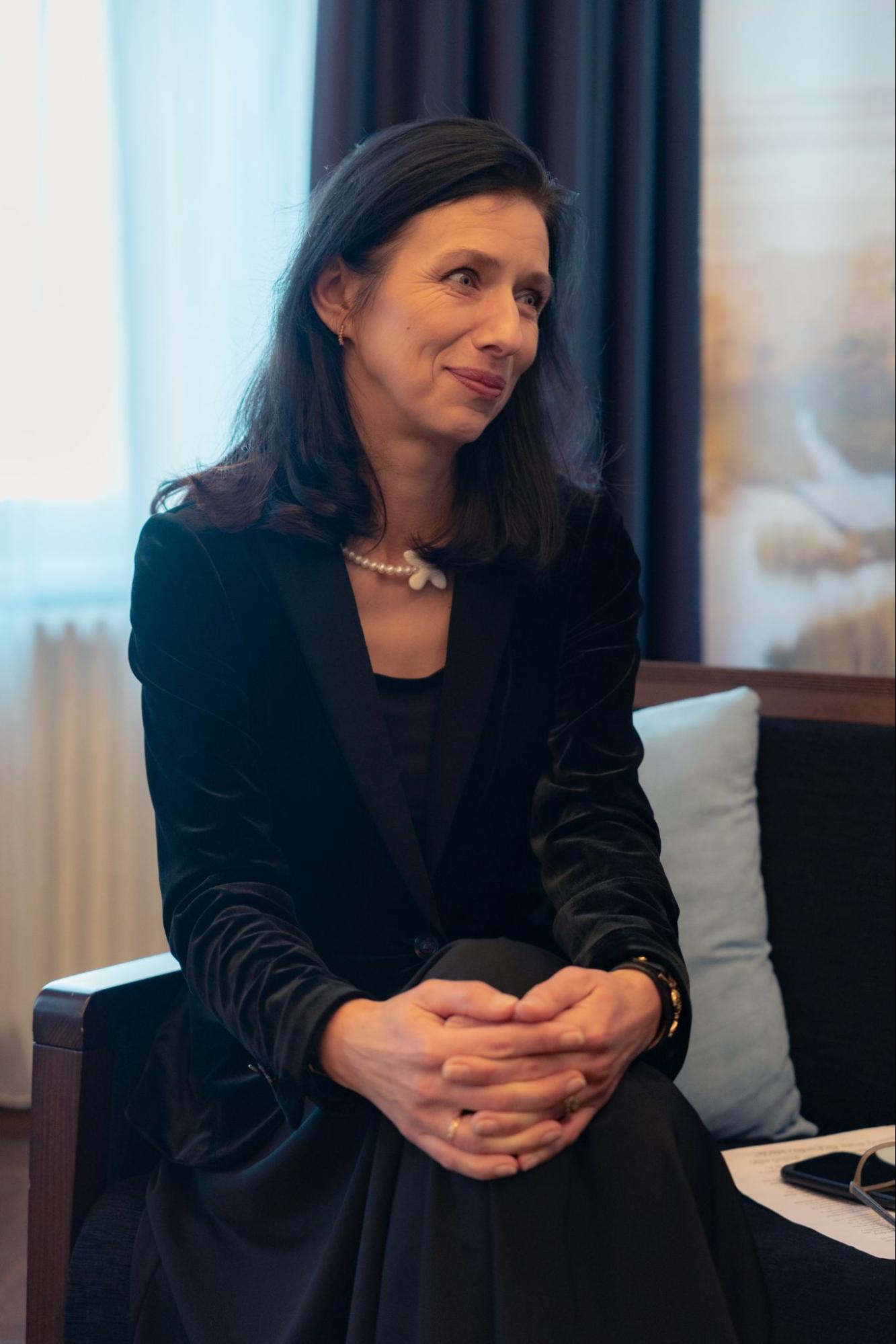
— Why have you chosen the Zhytomyr region?
— It was because of the call from Ukraine's president and also because for us, it's a smart move to choose a particular area, as it's sort of easier not to spread our development and humanitarian aid, but just to really help one region. Our goal was to invite all other countries to choose a specific region, and then, we could build our assistance step by step and extend it. The kindergarten in Ovruch that we recently restored is a great example — we are already finishing the second phase, and we will open it very soon. Then, of course, if you build a kindergarten, you know that children need books and computers, so we try to also sort of connect all our help and to be pragmatic.
The budget for 2024 is still being discussed in Estonia, but Margus Tsahkna, Estonia's minister of foreign affairs, has asked €14 million for the next four years. It's a huge increase, as it used to be €6 million. We know that a lot needs to be done. The budget discussions are still ongoing. Our foreign minister was in Ukraine at the European Foreign Affairs Committee meeting at the beginning of October, and he handed over the letter to Oleksandr Kubrakov, Ukraine's infrastructure minister, asking to specify the projects or areas that need the most help. When Ukraine says they need help in this area, we gather specific people in Estonia to see what we can do there.
Another successful project was the reconstruction of the bridge in Malyn. There will be other projects, of course, coming on the way. I am also very proud and happy that Estonia has the Estonian Development Cooperation Agency, which is funded by the government and is also doing enormous work here. They are helping these SOS children and houses, and they are also gathering other donors. So, it's basically the Estonian ideas, but some other countries or donors are involved. We are ready to help, and we also would like to have very good cooperation with the Ukrainian government and with the Zhytomyr region's governance.
There is also humanitarian development aid aimed at developing areas for humanitarian, not military purposes. We are focusing more on the development field. Ukrainian people have been living in this constant fear for more than a year and a half. All these bombed and demolished houses will stay many years in the memories of the Ukrainians, so the Estonian idea of starting the reconstruction now and not waiting until Ukraine's victory also has a moral component — we want to show that life goes on. I think there is this psychological moment. When we visited the Ovruch kindergarten, we had a very nice meeting with the children there. They sang songs to us, and we drew pictures together. There, I saw that, yes, we can build a nice environment for the kids, but if everything else is destroyed, it's not like they will go to the nice kindergarten through these mutilated streets and forget everything. So it's very important for the next generation, for the young people, to see that there is a bright future. Maybe they shouldn't see these devastations every day because, of course, they will nevertheless remain in your memories, in our memories, in the memories of the Europeans. Maybe we have to give this bright future and show this brutal enemy that we are not giving up. That was also one of the goals of our reconstruction ideas and policies.
— Can Zhytomyr people expect the continuation of investment in the Zhytomyr region? Will you keep focusing more on social infrastructure or housing?
— This is a very good question. We don't limit ourselves to only building houses or educational institutions. We are ready to provide assistance where it's needed, like it was with the Malyn bridge, which was destroyed by the Russian missile on March 6, 2022, and restored with the help of the Estonian government. We understood that restoring the bridge had a symbolic meaning. We also wanted to be practical because our budget is limited. When we were present at the opening of the Malyn bridge at the beginning of October, and I saw it with my own eyes, I immediately thought that bridges always connected people. At the same time, the bridge symbolically will connect Ukraine to the European Union and NATO. So, yes, of course, more projects are coming. The cooperation will definitely continue, and the help will continue. Although we understand that the most absolute priority now is to win the war, we also see the long-term consequences for the future. A lot needs to be done here in Ukraine, and Estonia is ready to help how we can and where we can, and not only in the Zhytomyr region. We are also ready to work with other countries and in other areas of support. For example, Estonian First Lady Sirje Karis has taken mental health issues under her patronage. So, there are many fields where Estonians are really active and helping as much as possible.
On Russian propaganda and democracy in Ukraine
"We trust you have all the democratic principles"
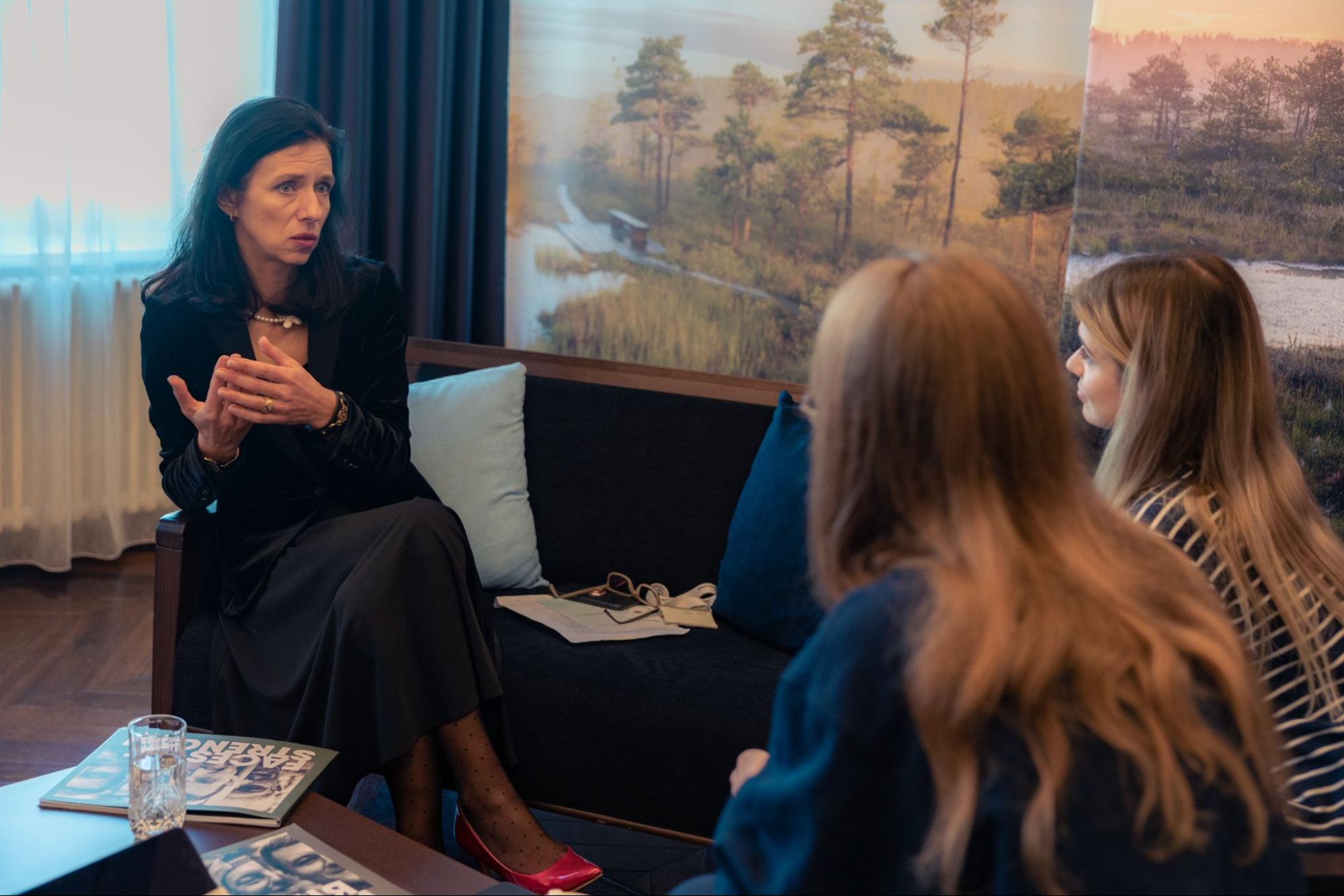
— While Estonia is actually doing a lot, and we can see that, do you feel that global attention to Ukraine is faltering? Would you say it could affect the institutional support of Ukraine?
— To tell you the truth, I don't like hearing this at all. I don't see any fatigue or decrease in support for Ukraine. I think it's on the contrary — Europe, and the West in general, are united more than ever. All this information or the news spread that there is fatigue only fuels the Russian propaganda, to be honest. Europe is not tired. The brutal war has been going on for more than 600 days. So, if the Ukrainians are fighting in the front line daily, living under air alarms and other challenges, who are we in Europe to say that we are tired? I think those messages are a very good example of Russian propaganda. I think that Europe's message is more that the war has lasted too long, and we need to do more for Ukraine. It's not about the fatigue of the Ukraine helping, but the contrary. We see these photos of the bombings, and we understand that it's not about the Russian regime. It's not about bombing the military facilities. The victims are civilians, hospitals, and apartment buildings. It's just a ruthless bombing. So, no, I don't see any fatigue, definitely not.
I just think, and I can also confirm, that our colleagues in the European Union, in Brussels, and in other international organizations are working every day to find new ways to isolate the aggressor. Estonia is also pioneering this isolation of the Russian Federation from international organizations, especially from having a seat on the deciding boards.
Our colleagues in the UN and in Geneva have really worked hard for Russia not to become a member of the United Nations Human Rights Council. The work is constantly ongoing, and it's not only about the ammunition. It's in all spheres because we need to make the price for the aggressor regime as high as possible. We don't have any difficulties in the European Union regarding the new sanctions packages. Of course, there are always minor details because every country has its relations with other countries and some issues that are very dear to the local electorate. But there's definitely no fatigue, so I don't even like this word.
— Since we touched on the idea of Russian propaganda, disinformation, and misinformation, let's talk about the loud article in Time magazine by Simon Schuster. It promotes the narrative that nobody already believes in Ukraine's victory except Ukrainians, except Zelensky. This also spurs anxiety among Ukrainians because we also see the tendency of some countries to decrease their military assistance, for example, Slovakia. So, this means that something is actually wrong with the support.
— I would like to say that, yeah, such articles, misinformation, and propaganda are exactly what feeds these discussions. And that is what the aggressor wants to see. Of course, as I said, every country has its governments, politicians, and elections. So, many issues are also important to the local population and to the electorate.
Normally, every country has some issues with its neighbors, and normally, these are all sorted out bilaterally, not in front of the public. But once you put them on the newsfeed, once you spread the misinformation, it's the easiest way for the aggressor to show that Europe is supposedly tired and give the Europeans the idea that, yes, maybe they are tired. This is really very dangerous, and Estonia has actually fought for many years with Russian fake news and war propaganda.
We have been very vocal in the international arena regarding this. Of course, there are rights to freedom of opinions and to the free media, and we are the number one in the world to support this. But when you cross the line, like the Russian Federation has been doing, when it's war propaganda or hate propaganda, then in our case, you need to prohibit it. We have prohibited many TV channels in Estonia that have been spreading war propaganda. So, in my opinion, attacking President Zelensky, who is really the top leader now in the world and is really fighting for his country, is the easiest way to spread misinformation. You always have to see what the source of the information is. These news are coming, and, of course, I can only speak on behalf of my own country, but I know that many of these countries who have allegedly cut the support to Ukraine actually haven't. It's all misinformation. In my opinion, the West and all other countries need to do more advertising and be more vocal about what they are doing because the other sides are always saying that we are not doing enough.
The European Union is founded on the principles of human rights, the rule of law, and democracy, and all 27 countries share these principles. There will always be statements of politicians who maybe don't share these values, and there always will be voices from the different leaders of different countries. But mainly, these are for the internal public. You see, there are many polls in European countries, and the locals, who are the electorate, are supporting Ukraine and your fight in this war for your land, for freedom. So I would like to really sort of stress what is going on — our help going on. It intensifies every day, and we are here for Ukraine.
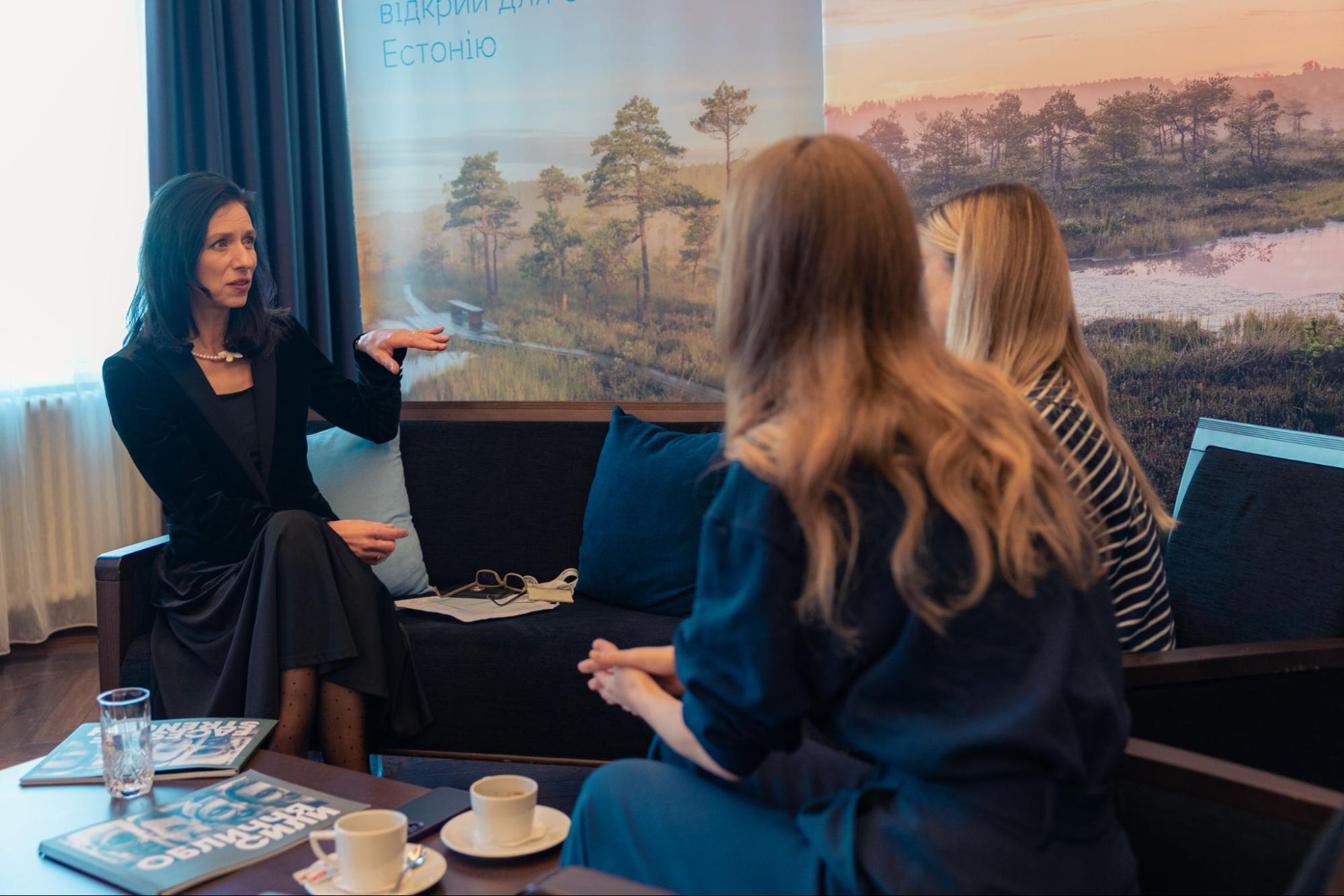
— Are there any requirements and conditions for Ukraine? For example, some partners are demanding the elections. Do you think that elections are necessary now? What are your expectations?
— Of course, I've read these ideas and discussions about that. And, of course, we also have some discussions in the Estonian media about that. But I'm a lawyer, and, for me, everything needs to be really legally explained. I think it's up to Ukraine and the Ukrainian people, Ukrainian leadership, to decide whether it would be possible to hold elections.
What are the possibilities that Ukrainian law provides in these circumstances? As I mentioned, I was previously stationed in Turkey, which experienced a devastating earthquake at the beginning of 2023. Eleven million people were affected, and Turkey had the parliamentary and presidential elections in May coming. Of course, there was no war against Turkey, but there were many questions regarding organizing voting of the IDPs or voting in the destroyed cities. Everybody needs to have the possibility to vote if they want.
So, as I understand, Ukraine is deeply analyzing all the possibilities right now quite intensively. It is really important to take into consideration the circumstances and conditions in every country. Estonia had 50 years of Soviet occupation, and we had all these Soviet institutions. After regaining independence, we started very quickly to become members of the European Union and NATO, and, sometimes, it was quite challenging to explain to our partners in the West the specifics. Of course, they wanted all good for us, but everything was not so easy because we were coming from the Soviet regime. We didn't have all these facilities that other European countries have been building after World War II for 50 years. We had to escape these Soviet living conditions. So, these specific circumstances of each country should always be taken into account. As we support the Ukrainian path towards the European Union, we trust you have all these democratic principles. I am still trusting and waiting for the Ukrainian analysis decisions, and I don't think I am in a position to say that you should do this or that.
On Estonia-Ukraine cooperation
"One thing is to win the war, but dealing with consequences is no less critical"
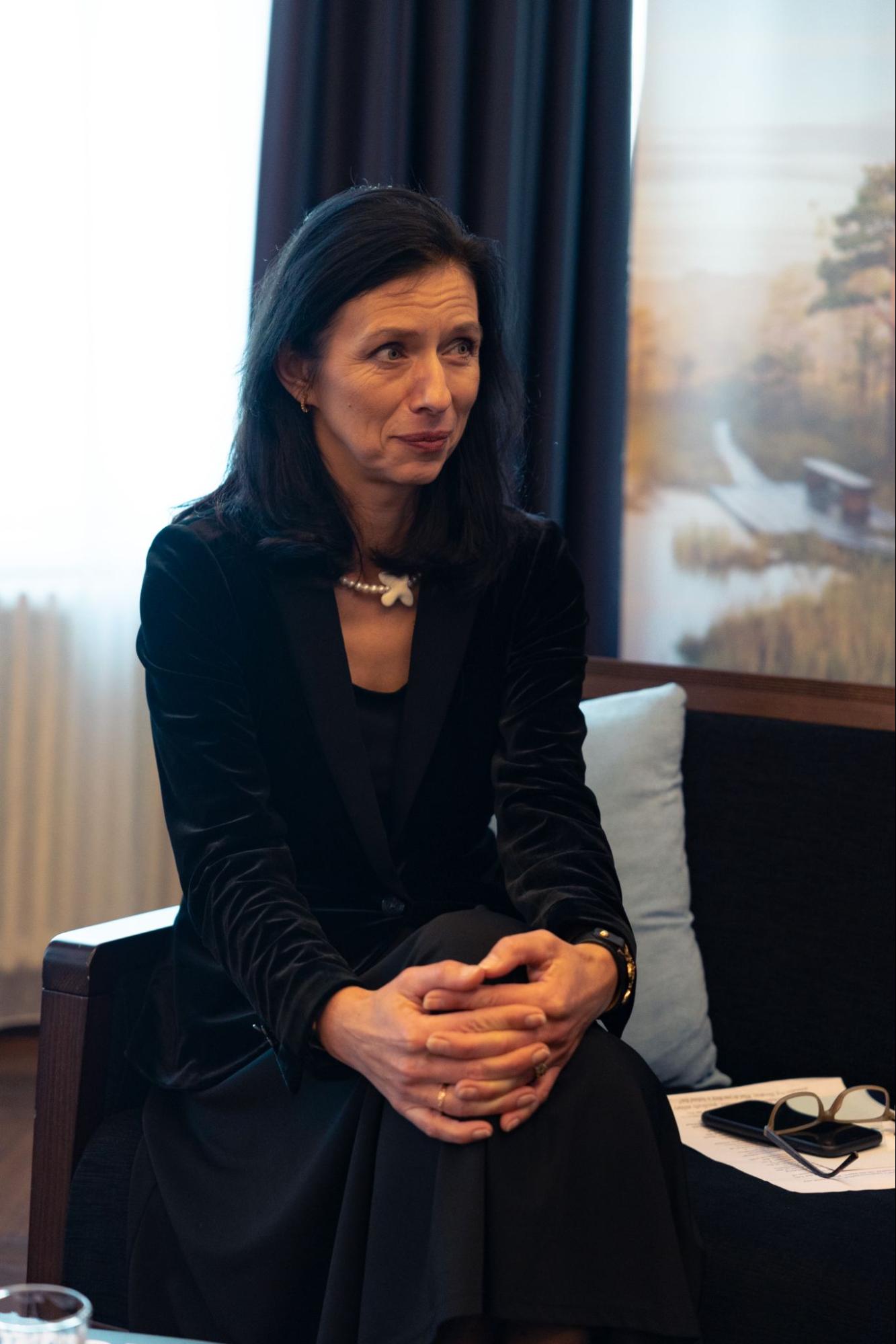
— Let's talk a little about the digital cooperation between Estonia and Ukraine. On September 2, 2022, Rubryka met with Kristjan Järvan, Estonia's Minister of entrepreneurship and information technologies. Estonia is one of the leaders in the implementation of digital services, and Ukraine's Ministry of Digital Transformation has closely worked with Estonia's government during the development of the Diia app. Now, Estonia plans to launch its own application similar to Diia.
— That work has been constantly going on. As you said, we are really, well, we think, and we hope that we are really sort of the pioneers in the digital field. This cooperation in the digital field is also one of our priorities. There are still many projects that are in the pipeline or under discussion. When discussing the reconstruction and rebuilding, we always try to include this digital component. We are really pushing forward in every field, and we are continuing this as well. Because we have the know-how, and maybe it's also a little bit easier to work with Ukraine because we come from a similar culture and the past. Also, we don't have so many differences in language issues. So, yeah, this is definitely continuing.
So many things are actually going on from the Estonian side in terms of assistance. I'm really lucky to be here as the representative of Estonia because I'm proud of my country and my people.
— Estonia is helping not only to recover buildings but also people. The collaboration between Estonian stakeholders, hospitals, governmental funds, and the Ukrainian BGV Charitable Foundation has helped Ukrainians to get the prosthetics. Will this program continue? Or maybe there is something similar?
— In September 2023, Estonia's health minister, Riina Sikkut, visited Kyiv and attended a meeting of the health ministers. During her time in Ukraine, she visited many rehabilitation centers. Although budgetary discussions for 2024 are still ongoing, I can assure you that there will be other projects that the Ministry of Health is looking forward to. When our minister was here, we had very fruitful conversations with her because she is also very dedicated to helping Ukraine. Over the years, Estonian doctors haven't seen that many wounds like that of Ukrainian soldiers. Of course, our soldiers have been on missions in Iraq and Afghanistan, but the scale was not close to what they've seen in Ukrainian soldiers. So it is also very important for our doctors to learn from your experience. Right now, I cannot, of course, promise any concrete projects, but the minister was here, and there definitely are discussions in Estonia about further support. One thing is to win the war, but dealing with consequences is no less critical.
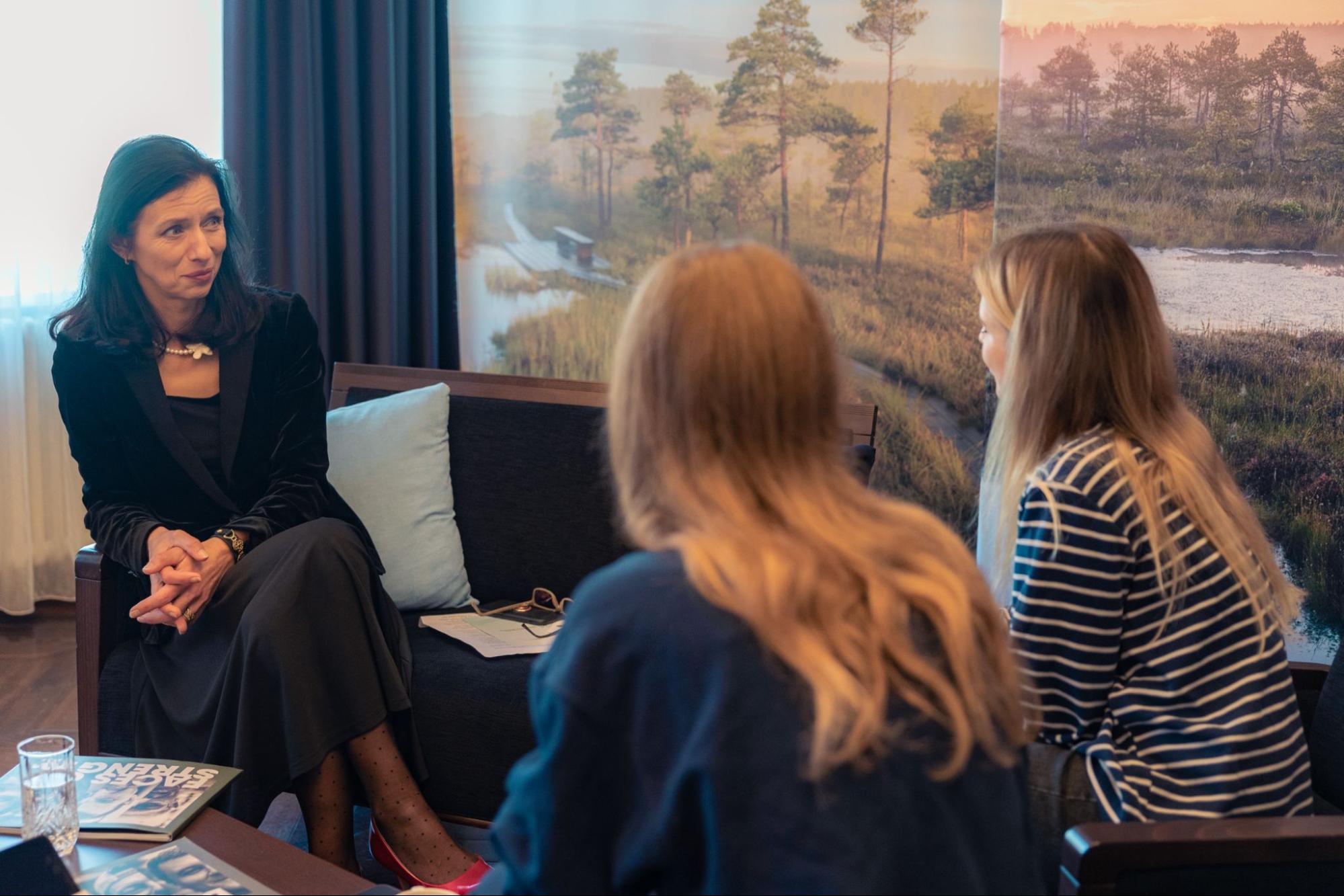
— Can you tell us a little bit about cooperation in the cultural sphere?
— The culture cooperation has intensified as well. I mean, it has actually intensified already since 2014. Estonian people are very dedicated to helping Ukraine in any field. And everybody who is doing something in Estonia — the choirs, the dancers, everybody has their sort of ideas. So many projects are going on. I can also confirm that once there is a band or choir or any cultural company coming from Ukraine, there will always be a full house. Estonians are really interested in your culture and to see how you are also fighting the war. All these cultural issues are important, and we see that you are really dedicated in every field.
More than 40,000 Ukrainians are living right now temporarily in the territory of Estonia, and they are also bringing their culture to Estonia. They are not living in camps or communities. They are constantly interacting with Estonians, so this interaction is also very nice to see.
— How do you see coexistence/cooperation with Russia in the future? It's probably not going anywhere, and the war will one day hopefully end. How do you envision interactions with Russia?
— No country can actually choose the geographical location, so we will have this neighbor for centuries. We are not naive. To be honest, I don't see dramatic or very rapid change in the Russian regime in the coming future. I think that Ukraine needs to win the war as soon as possible. And, of course, there should be an international tribunal that Estonia is also very much advocating for. Peace will never prevail if you don't judge the criminals.
We have to be always aware of our neighbors, and we have to coexist. Hopefully, when Ukraine wins the war, the Russian people understand the price of this brutal war. I think right now, the most important thing is to win the war and make the war criminals accountable. Then, we will see what kind of country we will be dealing with later on.








